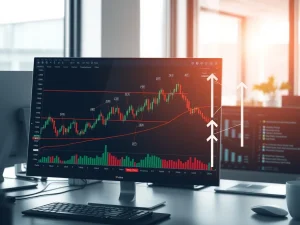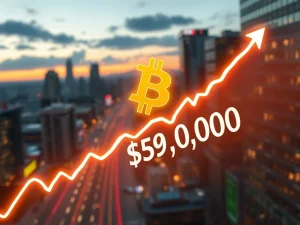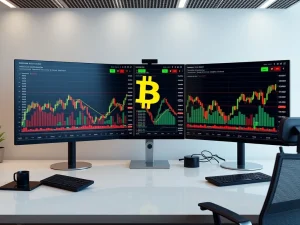Threat to Crypto: How Tariffs & Capital Controls Fragment Blockchain Networks

Are you concerned about the future of your crypto investments in an increasingly unstable global landscape? Imagine a world where your access to Bitcoin and other cryptocurrencies is restricted, not by technology, but by political borders and trade wars. This isn’t a dystopian fantasy; it’s a real threat looming over the decentralized world of blockchain networks. Industry executives are sounding the alarm, warning that escalating geopolitical tensions, fueled by tariffs and capital controls, could lead to the very fragmentation that blockchain was designed to prevent.
The Looming Shadow of Tariffs on Blockchain Networks
Remember when US President Trump hinted at massive tariffs on Chinese imports? While some tariffs were paused, the potential for a global trade war is far from over. Experts warn that these tariffs aren’t just about goods; they could have a devastating impact on the infrastructure underpinning blockchain technology.
Nicholas Roberts-Huntley, CEO of Concrete & Glow Finance, points out that aggressive trade policies can throw roadblocks in the way of node operators and validators – the very backbone of blockchain networks. Think of it like this: tariffs can disrupt the supply chains needed for essential hardware, potentially slowing down or even hindering the growth and operation of these networks. It’s not just about the price of crypto assets; it’s about the very foundation they are built upon.
Capital Controls: Erecting Walls in the Crypto Space
Beyond tariffs, the specter of capital controls is equally concerning. Imagine governments tightening their grip on the flow of money across borders. For crypto users, this could mean significant barriers to entry and participation. Joe Kelly, CEO of Unchained, highlights the chilling reality: if global trade deteriorates and capital controls become stricter, acquiring Bitcoin, especially in countries with restrictive financial policies, could become incredibly difficult.
Governments might start cracking down on exchanges and on-ramps, making it harder to buy, sell, and even use cryptocurrencies. This isn’t just a theoretical risk; it’s a potential scenario that could severely limit the accessibility and utility of crypto for everyday users worldwide.
Bitcoin Mining: A Vulnerable Point in the Geopolitical Crossfire
Why is Bitcoin particularly at risk? The answer lies in Bitcoin mining. Bitcoin’s network relies heavily on specialized hardware, particularly ASIC chips, for mining. These chips are predominantly manufactured in China. David Siemer, CEO of Wave Digital Assets, emphasizes that tariffs can directly disrupt the established ASIC supply chains.
Chinese manufacturers like Bitmain are crucial suppliers. Trade wars and tariffs could make it more expensive and difficult to acquire and maintain this essential mining hardware. This vulnerability isn’t just about miners; it impacts the entire Bitcoin network’s security and decentralization.
Geopolitical Tensions: Balkanizing the Blockchain World?
The ultimate fear is that escalating geopolitical tensions could lead to the ‘balkanization’ of blockchain networks. This means a fragmentation where, instead of a unified, global system, we see isolated, nationally controlled blockchain islands. Siemer warns that the erosion of blockchain’s core value proposition – its global, permissionless infrastructure – is the greater danger.
Imagine different countries imposing different regulations, technical standards, and even censorship on blockchain networks. This would undermine the very essence of a decentralized, borderless financial system. The dream of a globally accessible and censorship-resistant cryptocurrency ecosystem could be severely compromised.
Crypto’s Resilience: A Silver Lining in the Storm?
Amidst these challenges, there’s a glimmer of hope. Executives like Neil Chopra from Fireblocks point out that these turbulent times also present an opportunity for crypto to demonstrate its inherent value. Bitcoin, despite market volatility, has shown “signs of resilience,” acting as a potential hedge against geopolitical risks.
The very factors that threaten traditional financial systems – trade wars, inflation, and political instability – could ironically strengthen the case for decentralized, censorship-resistant cryptocurrencies. As traditional markets react to geopolitical uncertainty, crypto might emerge as a safe haven, proving its long-term utility on the global stage.
Navigating the Fragmented Future: Actionable Insights
So, what does this mean for you as a crypto enthusiast or investor? Here are some key takeaways and actionable insights:
- Stay Informed: Keep a close watch on global geopolitical developments, trade policies, and regulatory changes related to crypto in different regions.
- Diversify Geographically: Consider the geographical distribution of your crypto holdings and mining operations to mitigate risks associated with regional conflicts or regulations.
- Support Decentralization: Advocate for and support projects that prioritize decentralization and censorship resistance to ensure the long-term viability of a global crypto ecosystem.
- Focus on Utility: The real-world utility of cryptocurrencies becomes even more critical in times of uncertainty. Focus on projects that are building practical applications and solving real-world problems.
- Prepare for Volatility: Geopolitical tensions often lead to market volatility. Be prepared for price swings and manage your risk accordingly.
Conclusion: Will Crypto Overcome Fragmentation?
The threat of tariffs and capital controls fragmenting blockchain networks is real and should not be ignored. However, history has shown that innovation often thrives in adversity. While the road ahead may be bumpy, the inherent resilience and decentralized nature of blockchain technology offer a powerful counterforce to these fragmenting pressures. Whether crypto can fully overcome these challenges remains to be seen, but one thing is clear: the coming years will be crucial in shaping the future of a truly global and accessible digital financial system. The stakes are high, but so is the potential reward for a decentralized future.









